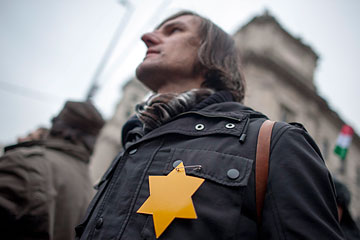
A protester wears a yellow Jewish star as thousands attend a demonstration against Nazism in Budapest in December
(4 of 5)
Orban's critics stop well short of accusing him of anti-Semitism. But the electoral politics of a changing, more conservative Hungary may have made him more willing to tolerate it in others. "Fidesz feels that Jobbik is its biggest threat," says Peter Kreko, director at the Budapest-based Political Capital Institute. "They don't have the same approach, but [Fidesz] leaves enough gaps to let the voters believe what they want." And that can create a trickle-down effect. "When you can hear politicians saying this kind of thing in parliament or journalists saying it in the media," says Josef Horvath, president of Bet Shalom synagogue, "then ordinary people start to think there's nothing wrong in complaining about 'dirty Jews' when they're at the supermarket." As a result, many Jews think it prudent to conceal their identity in public. "People hide their kippahs beneath baseball hats now," says Zoltan Radnoti, rabbi for the same synagogue. "Some people don't even want to friend me [on Facebook]. They say, 'Rabbi, please, I don't want people at work to know I'm Jewish.'"
This fear is erupting precisely at a moment when Jewish culture is flourishing in Budapest. Jewish educator and author Linda Vero-Ban began working to revive the city's dormant Jewish culture in the early 1990s, when she was just a teenager. "You couldn't practice your religion under communism, so it wasn't until after the regime fell that people began trying to recover their identity," she says. "They don't go to synagogue, but they still want to express their Jewish culture." For Hungarians who have only recently learned that their parents or grandparents were Jewish, secular places like the Macesz Huszar bistro can be an appealing way to connect with their heritage. "What's the easiest way to feel Jewish?" asks the restaurant's owner, David Popovits. "Eat some matzo-ball soup."
And yet even people like Vero-Ban, who is married to Rabbi Tamas Vero and loves Budapest, is wondering whether it is time to leave. About two years ago, her husband took their two young daughters out shopping. As he knelt on the floor to help his girls try on shoes, a passerby spied the rabbi's kippah and began shouting slurs at him while onlookers did nothing. If the family hasn't emigrated yet, it's because Vero feels a responsibility to his community. Still, the question figured prominently in the rabbi's Rosh Hashanah sermon last year. "I wonder if we are brave enough to face the unknown now," Vero said. "Or if, in a few centuries, our descendants will ask, Why did the Jews not return to the Holy Land in the 21st century? Did they not learn from history?"
